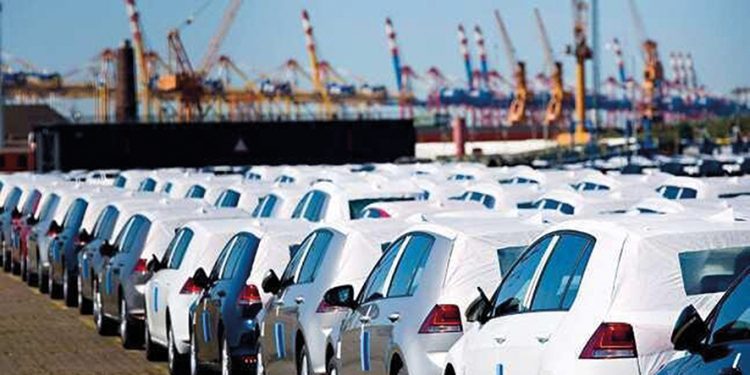A first-time peruser of Georgia’s trade statistics may be surprised to find that auto exports landed Georgia nearly $904 million in 2022, accounting for more than 16% of total exports. That’s roughly double the value of Georgian vehicle exports in 2021. The surge in growth is welcome news to the many individual resellers that comprise the business, and who over the past decade have had numerous occasions to doubt whether their source of income would survive changing regional customs regulations, attempts to clear roads of faulty vehicles, the pandemic, and now, of course, war in Ukraine.
But how has Georgia, a country with no native auto industry of its own, managed to secure a position for itself as a vehicle resale hub? And what value added does the sector bring to the Georgian economy?

From lemons to riches
Georgia first became a stop for American scrap vehicles in 2006, and this has grown steadily in recent years. Most of these cars are damaged vehicles sold off by insurance companies in the US market, Senior Research Associate at TBC Capital Andro Tvaliashvili told Investor.ge, noting “the major value-add Georgia has to offer is the renewal and servicing of these vehicles.” Georgia’s geographic location, low import tax rates on vehicles, and the relatively low cost of automobile services have enabled the country to become something of a used car market hub, attracting purchasers from as far as Central Asia to the countries of the Arabian Gulf.
In the first 11 months of 2022, exports equaled about 55% of imports
Relatively insignificant until 2006, Georgian re-exports of automobiles accounted for nearly a quarter of total exports by 2013, before experiencing a downturn between 2015-2017. Doubts then riddled the market whether there would ever be another Lari to make in the business. But strong recovery started again in 2018, and 2019 further topped expectations. 2020 was a more difficult year for the auto industry, as Covid-19 and other changes put a halt on growth. Border closures and supply chain disruptions sent a strong negative shock to the industry in Georgia.
But of even greater consequence were changes within the Russia-led Eurasian Customs Union, which obliged Armenia, one of the Georgian auto market’s top importers, to increase excise taxes on imported vehicles. In 2019, Armenia accounted for 32% of demand for Georgian re-exported vehicles, while in 2020 it accounted for nearly none. This, in tandem with Covid, resulted in a reduction of nearly 45% in auto exports. However, it’s worth noting that there was a high baseline in 2019, when customers in Armenia, anticipating the change to the country’s customs codex, began purchasing cars from Georgia en masse.
Armenia’s new customs laws meant do or die for exporters. TBC Capital’s Tvaliashvili says “similar future risks could only be hedged by diversifying exports, which I believe has been done successfully by increasing penetration of the Central Asian market.” The impressive speed with which Georgian auto exporters have found new markets, particularly in Central Asia and the Gulf, has been helped by the lifting of Covid-19 regulations, allowing car exports to recover by 13% in 2021. Surprisingly, demand from Ukraine remained fairly stable in 2022, with Ukrainian orders accounting for around 19% of Georgian auto exports in the first three quarters of 2022.
In fact, Georgian auto exports did very well in 2022 in general. Tvaliashvili notes that “a significant reason behind the surge in the numbers is due to the globally increased prices of brand new, as well as used cars. Pent-up demand due to supply chain disruptions and microchip shortages following the pandemic is also a factor that caused significant growth.”
Georgia exported more than $900 million worth of vehicles in 2022 and imported nearly $1.3 billion worth
This year, Azerbaijan, Russia, and Ukraine retained their usual leading positions on the Georgian auto export market, and Armenia reappeared as a top importer as well. Regarding the effects of the ongoing Russo-Ukrainian war, Tvaliashvili states that: “We cannot say that the Ukrainian market has been lost for the industry. Ukraine still remains in the top export markets.”
Other countries which imported automobiles from Georgia in significant quantities in 2022 include Turkey and countries in Central Asia, particularly Kazakhstan. A surprise country on the list is Belgium, which in recent years has also been importing a significant number of vehicles from Georgia, as has the UAE since 2020.

Down the road
It is debatable whether the value the auto business brings to Georgia is commensurate with its consistent position as a leading export business; while Georgia may have exported more than $900 million worth of vehicles in 2022, it imported nearly $1.3 billion worth (11.6% of total imports) in the first 11 months of the year. Calculating the value-added is difficult because many of these vehicles remain in Georgia, and vehicles imported may not be exported in the same year. Moreover, the margins enjoyed by resellers are not particularly high.
The diversification of source countries, and large growth rates in the value of car re-exports, along with a shift in the demand for newer cars, imply considerable growth potential in Georgia’s role as a transit hub for automobiles
But there are a few upsides. A clear one is that the business is good for the state treasury, which enjoys not insignificant excise tax revenue. Moreover, the ratio of exported to imported cars has been increasing in recent years, meaning less of the used cars are staying in Georgia, and are instead being shipped onward to third-country markets. For example, in 2013, the value of re-exported vehicles amounted to a third of the value of imported cars. The ratio reached its maximum in 2019, as exports were equal to almost two-thirds of the imported value. In the first 11 months of 2022, exports equaled about 55% of imports.
Recent developments on the market point to the existence of important growth opportunities for the Georgian automobile re-export market. The diversification of source countries, and large growth rates in the value of car re-exports, along with a shift in the demand for newer cars, imply considerable growth potential in Georgia’s role as a transit hub for automobiles.
There is, however, one potential risk, TBC Capital’s Tvaliashvili states: “The largest risk, which is not yet in sight, may be domestic regulations which could restrict the imports of salvage vehicles. I believe that re-exports are sustainable in the medium and long-term. As the major re-export markets are developing economies, it is expected that their automotive fleet will need renewal in the coming years as well, not to mention increased demand in parallel with further economic development.”
By Mariam Tsinstabadze for Investor.ge














